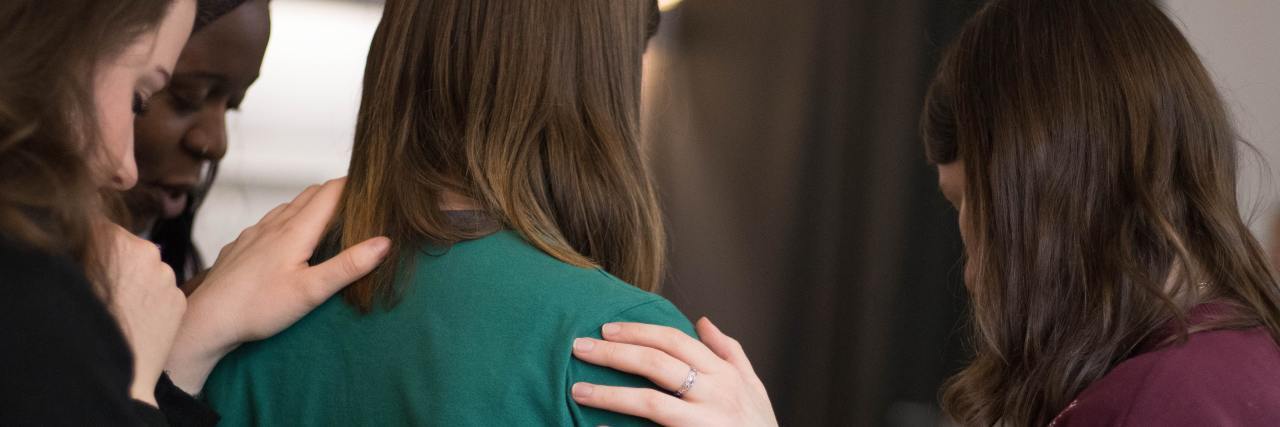This Common Support Group Phrase Had a Double Meaning When I Was Suicidal
Editor's Note
If you experience suicidal thoughts or have lost someone to suicide, the following post could be potentially triggering. You can contact the Crisis Text Line by texting “START” to 741741.
A while back, I made a note about something that was said to me in a support group meeting. This happens often. In many meetings, I will find myself writing down insights others share so that I can ponder them later.
This particular phrase isn’t an “insight,” however. It’s said often in these types of support groups and the one who says it probably has no idea that it can have two meanings. It’s spoken as casually as the more common term, “Thanks for sharing,” that several say at the end of every share.
Most of the time, this expression is saved for those instances someone shares a particularly heartfelt experience. There are some support group members who gravitate towards using it regularly, so during some meetings, it might be heard more often than usual. But in most of the groups I attend, it’s rarely used.
This phrase is: “We’re glad you’re here.”
On the surface, it doesn’t look like it has a double meaning. It’s pretty straightforward. When you tell someone you are glad that they are here, then that’s what you mean — you are glad that person is at the meeting.
I’ve been involved with support groups now for over two and a half years. For the first 18 months, I didn’t hear it that often. I said it maybe once or twice. But then, in September 2019, it was said to me after I shared and a lightbulb went off.
I’m bipolar type 2 and have several other medical and mental health issues. Suicidal thoughts flood my mind often when I’m really depressed. A stretch of several days in September 2019 was one of those times. Though I never got as far as having a plan on how to do it, this time I got very close.
I went to a meeting because it’s what recovering addicts do. When I’m depressed, I’m usually quiet and won’t talk to anyone. I didn’t plan on sharing. I was just going to listen to others and was hoping I’d walk out of there encouraged enough to not even want to make a plan.
I can’t remember what the topic that night was, or even exactly what I shared. I’m pretty sure I shared some of the struggles I was dealing with and that I was really depressed. I may have even shared that I was suicidal.
I finished my share and heard many say the standard, “Thanks for sharing.” But then I heard a sole person say, “We’re glad you’re here.”
You know those “lightbulb moments” that you sometimes get? I had one right then.
I don’t know if the person who said it meant for it to only have the straightforward meaning. I didn’t notice who said it so I couldn’t ask. But when those words were spoken, to me, at that time, in my current state of mind, it meant more than “someone was glad I was at the meeting.”
To me, in that moment, it meant that the person was glad I was still here, on earth… alive.
I came across that phrase today when I was looking through some old notes. As I was even more suicidal a couple of weeks ago and did have a plan during that dark time, I’m thankful that I was reminded that there are those who are glad I’m still here.
I’m also thankful for others who are also still here, and not just at a meeting.
On this same idea of being glad you are here, I want to share a life-saving question that has saved my daughter, some of her friends, my mom and myself.
It is, “Will you promise you’ll stay safe?”
My daughter and my boyfriend know, when I get really depressed or incredibly anxious, to ask me. I do the same for them. We don’t answer until we are sure we can really promise… and being asked the question helped save me that night a couple of weeks ago. Suicide hotlines are helpful, but knowing that someone you know cares enough to go out on a limb and ask that question can literally be the difference between life and death.
If you see someone really down and have even the slightest suspicion that they are thinking about suicide, ask the question. If suicide is being thought about, it’s not offensive if you ask. Those six words could potentially save a life.
Photo by Rosie Fraser on Unsplash

